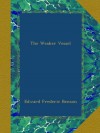brokenbiscuits
Best of 2013 and 1913, Part Five: 1913, the Second Installment
The Weaker Vessel by EF Benson
All the books I’ve read by E.F. Benson have been droll/slightly campy comedies, so I felt right at home as the book opens with the spirited daughter of a clergyman whose comical, ultra-religious stepmother won’t let her read salacious literature, play jolly tunes on the organ, or have any other kind of fun. Then I was quite surprised when the book turned out to be a moral tale about the perils of alcoholism and adultery.
It appears that men are the weaker vessel of the title. While the description of the alcoholic husband seemed extremely true to life, it was somewhat painful to read the glorification of wifely codependency. I didn’t get the impression that Benson understood anything about relationships between men and women, he was just spitting out cliches, but the story was interesting and readable the whole way through. I especially liked his shiny portrayal of acting and the theater. At the end there was a very easy way out that would have punished the guilty and allowed the blameless characters to couple off, but he didn’t take that. Instead he presented a very forward-thinking view of disability that even today is rarely embraced in literature, so I thought that was neat.
One of the things I like about reading the novels of 100 years ago is that it’s harder to guess what’s going to happen, because we’re not steeped in the tropes of that day. There was a sticky elevator mentioned several times, and I was positive that someone was going to get trapped in it a la “The Way Up To Heaven” by Roald Dahl. But no, that was all in my mind; I guess people just talked about their elevators a lot back if they had them.
Eldorado by Baroness Orczy
A delightful book in the Scarlet Pimpernel series. It opens in France, during the height of the The Terror, at the Opera, where all the surviving aristocrats have come, just like they always do, dressed in their finest. But they’re all trembling in their funny French shoes because no one knows who among them will be denounced and beheaded in the morning. If you wrote a YA novel set in a dystopia like that, you’d be accused of overdoing it, but it really happened! The Scarlet Pimpernel has a plan to rescue the Dauphin, who is imprisoned in the Temple. This really piqued my curiosity because we know that in real life the Dauphin died there and was not rescued, so was Baroness Orczy going to allow her hero to fail?
Eldorado is not as good as the first in the series, The Scarlet Pimpernel, but nothing could be since a) the most exciting part is finding out the Scarlet Pimpernel’s secret identity and b) I read The Scarelet Pimpernel at age eleven, which is surely the Golden Age (in the Peter Graham sense) for these books. However, Eldorado notably lacks anti-Semitism, which is nice. I do not know why the novel is called Eldorado, as it is set in England and France and there’s no gold. By the way, I always thought “Baroness Orczy” was a pen name and she was no more a baroness than I am Count Chocula, but I finally looked her up on Wikipedia and she actually was one!
The Coryston Family by Mrs. Humphry Ward
My brother said that when he was in graduate school studying English, Mrs. Humphry Ward was dismissed as a nobody; they didn’t read any of her books; and she wasn’t sufficiently rehabilitated to be given a first name. (Turns out she was Mary Augusta Ward.) But I liked this book and I’m looking forward to her 1914 offering. My brother was also told she was a Victorian so he could not believe she had a book in 1913. However, all English writers did not conveniently die at the same moment as Queen Victoria, so there was some overlap, and in fact two thirds of Mrs. Humphry Ward’s books were written in the Edwardian period. She did seem to have a kind of Victorian viewpoint, though. There was a strange timeless quality to this novel, and it’s hard to know when it was set. The House of Commons was debating a Land Bill and the aristocrats were very concerned about their “rights” and estates being taken from them, making it feel like 1830. But the main character was a Suffragist, which was accepted as a common viewpoint (although derided as wrong), making it seem more contemporary to 1913. The characters drove about in strange conveyances but I think I remember some cars. I guess it was probably set in 1913 but the ways of the English aristocracy are so peculiar and unchanging that everything was the same as in Victorian times.
The characters had political opinions ranging from Conservative to radical Socialist. I couldn’t figure out which platform the author agreed with, except that she seemed to think women should not vote but instead use their exquisite goodness to make the world a better place without meddling in politics. I wrote a review on Goodreads where I actually explained the plot.
Coming Soon: the final installment of 1913, Best of 1813, and Best of 2113.





